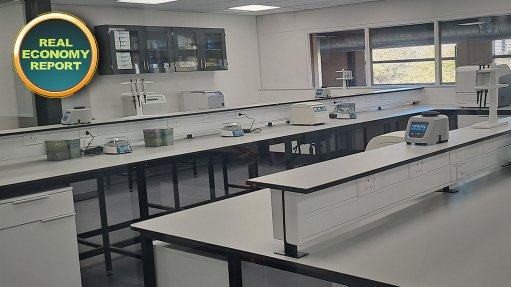Altron FinTech index shows household financial resilience on recovery path
The latest Altron Fintech Household Financial Resilience Index (Afhri) is returning to growth, indicating that there has been good recovery in most key economic sectors since the third quarter of 2020, the height of the Covid-19 pandemic.
The 2021 fourth-quarter Afhri, compiled by economist Dr Roelof Botha on behalf of Altron FinTech, shows a consistent improvement in the ratio of household income to debt costs – an improvement of 23.3% over the past two years – and the recovery of household disposable income since the fourth quarter of 2021, with a 2.7% gain.
The index was commissioned by Altron FinTech to provide essential data giving more clarity on the financial health of South African households and their ability to cope with debt.
“The Afhri trend line now broadly mimics other key economic indicators in South Africa, including gross domestic product (GDP), retail trade sales and the IHS Markit Composite Purchasing Managers’ Index. It also echoes the results of the latest Absa Purchasing Managers’ Index, which has shown three consecutive months of gains, suggesting a tentative return of confidence in the country,” says Botha.
“Although the index is still marginally lower than during the fourth quarters of 2019 and 2020, it is now 8.1% stronger than during the worst quarter of the pandemic. It also increased by 2.2% on a quarter-on-quarter basis.”
Between the third and fourth quarters of 2021, only six of the 20 indicators recorded declines, a clear indication of further progress with the recovery of the financial disposition of households.
“Unfortunately, the unrest that occurred in July 2021 took its toll on the third quarter, which prevented an improvement in the index on a year-on-year basis.”
Compared with the second quarter of 2019, eleven of the indicators have recorded improvements, five of them in double-digit territory.
“Unfortunately, three of the four indicators that possess the largest weighting in the index have not yet recovered from the effects of the pandemic: employment in the private sector and salaries in both the public and private sectors,” Botha comments.
While the latest results of the Afhri confirm a systematic improvement in the ability of the average household in South Africa to incur and service debt, government needs to prioritise policies aimed at employment creation, especially in the private sector, where a predictable causal relationship exists between salaries and value added in the economy.
“Owing to the strong positive correlation between private-sector credit extension and GDP growth, it has become a matter of urgency for government to reconsider the undue regulatory burden that has been placed on the formal microfinance sector. Unless lower income groups are allowed easier access to credit, the pace of employment creation in South Africa will remain muted,” he elaborates.
According to Botha, short-term loans and unsecured credit by microfinance institutions have played a significant role in the ability of individuals to expedite expenditure on consumption goods, including food, and also to assist with the financing of working capital for small and microenterprises.
He references an econometric modelling exercise undertaken in 2019 by the University of Johannesburg’s Professor Ilse Botha, which indicated that, between the first quarter of 2015 and the third quarter of 2018, South Africa’s GDP would have been R191-billion lower in the absence of credit provided by microfinance institutions.
“In commissioning this index, we are again providing a much-needed and unbiased industrywide benchmark for regulators, policymakers, statisticians and our customers, helping them to understand what exactly impacts the financial resilience of South African households and, importantly, their ability to incur and service debt,” explains Altron FinTech CEO Johan Gellatly.
Comments
Press Office
Announcements
What's On
Subscribe to improve your user experience...
Option 1 (equivalent of R125 a month):
Receive a weekly copy of Creamer Media's Engineering News & Mining Weekly magazine
(print copy for those in South Africa and e-magazine for those outside of South Africa)
Receive daily email newsletters
Access to full search results
Access archive of magazine back copies
Access to Projects in Progress
Access to ONE Research Report of your choice in PDF format
Option 2 (equivalent of R375 a month):
All benefits from Option 1
PLUS
Access to Creamer Media's Research Channel Africa for ALL Research Reports, in PDF format, on various industrial and mining sectors
including Electricity; Water; Energy Transition; Hydrogen; Roads, Rail and Ports; Coal; Gold; Platinum; Battery Metals; etc.
Already a subscriber?
Forgotten your password?
Receive weekly copy of Creamer Media's Engineering News & Mining Weekly magazine (print copy for those in South Africa and e-magazine for those outside of South Africa)
➕
Recieve daily email newsletters
➕
Access to full search results
➕
Access archive of magazine back copies
➕
Access to Projects in Progress
➕
Access to ONE Research Report of your choice in PDF format
RESEARCH CHANNEL AFRICA
R4500 (equivalent of R375 a month)
SUBSCRIBEAll benefits from Option 1
➕
Access to Creamer Media's Research Channel Africa for ALL Research Reports on various industrial and mining sectors, in PDF format, including on:
Electricity
➕
Water
➕
Energy Transition
➕
Hydrogen
➕
Roads, Rail and Ports
➕
Coal
➕
Gold
➕
Platinum
➕
Battery Metals
➕
etc.
Receive all benefits from Option 1 or Option 2 delivered to numerous people at your company
➕
Multiple User names and Passwords for simultaneous log-ins
➕
Intranet integration access to all in your organisation


















